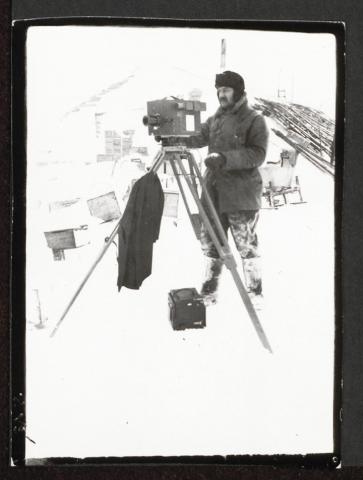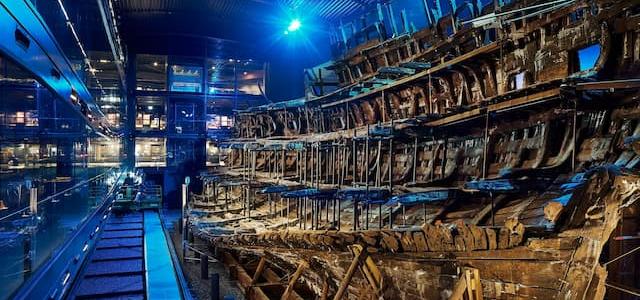
Captain Scott’s ‘lost’ photographic negatives saved for the nation
The Polar Museum at the Scott Polar Research Institute, University of Cambridge, is proud to announce that it has successfully raised the £275,000 needed to be able to purchase the 113 photographic negatives, thanks to public support.

The negatives represent an extraordinary visual record of Scott’s last expedition, but were in danger of being sold abroad.
The National Heritage Memorial Fund (NHMF) has just awarded the Scott Polar Research Institute (SPRI) a grant of £233,450 to secure the negatives. This clears the final hurdle in the race to secure the funds in time. The museum has already received generous support from the V&A Purchase Grant Fund and other private donors. In addition, a significant amount was raised through a public appeal campaign, spearheaded by Sir Ranulph Fiennes.
Dame Jenny Abramsky, Chair of the NHMF, said: "Captain Scott’s images provide us with an extraordinary insight into the rigours of his epic but ultimately doomed expedition. As precious as the corresponding original prints, these negatives record not only day-to-day life in the Antarctic but also the development of Scott’s photographic skills. The National Heritage Memorial Fund & the fund of last resort – is proud to be providing the final part of the funding jigsaw which will ensure these negatives are kept together as part of the Institute’s wider public collection."
The negatives are a record of Scott’s earliest photographic attempts – under the guidance of expedition photographer Herbert Ponting - through to his unparalleled images of his team on the journey to the South Pole. The force, control and beauty of his portraits and landscapes number them among some of the finest early images of the Antarctic.
Sir Ranulph Fiennes said: "Scott’s negatives can now take their rightful place in Cambridge alongside the camera on which they were taken, as well as the remaining Scott and Herbert Ponting prints - all of which speak so powerfully to us of the courage and sacrifice of those on the British Antarctic Expedition.
"The negatives have been recently rediscovered, having been thought lost. If the Scott Polar Research Institute had not been successful then there was every chance that they would have been sold abroad and into a private collection."
Professor Julian Dowdeswell, Director of SPRI, said: "The overwhelming level of support and assistance from the public and from charitable trusts and bodies has helped The Scott Polar Research Institute purchase this extraordinary visual record of Scott’s last heroic expedition. As we have no budget for acquisitions, we have been delighted to see how the story of Scott still captures the public imagination. As part of the University of Cambridge, SPRI will ensure that these negatives are cared for to the highest possible standards and, once digitised, we will ensure that these resources will be within reach of a worldwide audience."
Following a period of conservation and research, the Polar Museum plans to mount a public exhibition of the images.
Notes to editors
The Scott Polar Research Institute is a sub-department of the University of Cambridge. It was founded in 1920 as the national memorial to Captain Scott and the Polar party. The institute has been an international centre for polar explorers, scholars and enthusiasts ever since. From rigorous scientific enquiry into the nature of climate change to protecting our historic polar heritage, the Scott Polar Research Institute has remained at the vanguard of polar work for more than 85 years.
The Polar Museum is dedicated to providing education and outreach to as broad an audience as possible. For details of events, tours, educational resources and visits please contact our Education and Outreach department via email: schools@spri.cam.ac.uk.
Captain Robert Falcon Scott (1868-1912) is probably Britain's most famous Antarctic explorer and better known for his contributions to the literature of exploration than as a photographer. Born in Plymouth, he joined the Royal Navy as a cadet at the age of thirteen. Scott led his second expedition to the Antarctic in 1910. He took a strong scientific team, both naval and civilian, that included several companions from his previous expedition. Aware of the rival bid of the Norwegian explorer, Roald Amundsen, who was equipped with excellent dog teams, Scott started out for the Pole in late October 1911. With the aid of experimental motor tractors, dog teams and ponies, he followed his previous route across the Ross Ice Shelf before resorting to man-hauling up the Beardmore Glacier along a route pioneered by Sir Ernest Shackleton in 1908-09.
A five-man polar party successfully traversed the plateau, reaching the Pole on 17 January 1912, to find that Amundsen had reached the South Pole on 14 December 1911. On the return journey, the weakened party faced exceptionally unfavourable weather and sledging conditions. Edgar Evans was the first to die, near the foot of the Beardmore Glacier. Lawrence Oates followed on 16 March, when he famously left the tent in a blizzard for the good of the party. Scott himself died with Henry Bowers and Edward Wilson in late March 1912, laid up by a blizzard 11 miles short of One Ton Depot. He was 44 years old. During these last days in the tent, Scott kept up his journal, wrote twelve letters to friends, family, and next of kin and left a message for the public explaining his reasons for the failure of the expedition.
Further information
Images available on request.
For more information, please email Stuart Roberts, University of Cambridge Communications Officer at communications@admin.cam.ac.ukor call 01223 764 982 or Bridget Cusack, Museum Development Coordinator at The Polar Museum, Scott Polar Research Institute. Atbc371@cam.ac.uk or call 01223 336573.

